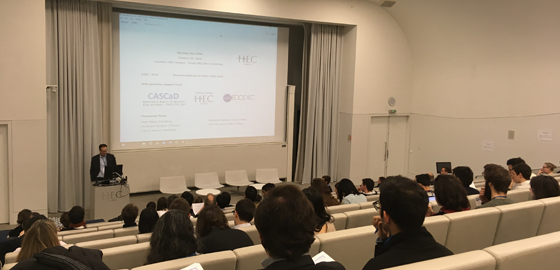HEC’s Inaugural Big Data Day Hits an Upward Curve
Almost 200 researchers, professors and students gathered on January 23, 2018, for HEC’s first-ever Big Data Day devoted to promoting the school’s research in Big Data and business analytics. The links between groundbreaking data research, the development of innovative teaching programs, and leading academic research emerged in a day rich in exchange and discovery.
Days devoted to Big Data are increasingly popular with versions sprouting up in conference centers as far-flung as Baku, Los Angeles, Oslo and London. Yet there could be no denying the pioneering feel to HEC’s inaugural Big Data Day. “You know, multidisciplinary research is often a top-down decision,” noted co-organizer Christophe Pérignon, HEC Associate Dean for Research. “But, what we saw today is clear proof that Big Data leads to collaborations amongst researchers across fields and groups (faculty, students and practitioners). We’re hoping it could lead to even more synergies amongst members of the HEC community.”

Indeed, the eight-hour exchange at the Bellon Amphitheater allowed HEC researchers to gauge the wide-ranging work of their colleagues from a diversity of departments. In parallel, well over 100 students from the Digital Major (Master in Management), MSc in Data Science for Business and the MBA were exposed to the researchers’ latest scientific developments, “always an important component of HEC programs,” insisted Pérignon.
The event also allowed the school’s partner firms to witness HEC’s most recent Big Data research in fields as diverse as spatial inequality, firm disclosures, the links between fame and creativity, and blockchain. This last presentation was made with brilliant clarity by Bruno Biais, Distinguished Visiting Professor of finance at HEC.
Linking Research to Business
Dean Peter Todd kicked off the day by reminding the packed auditorium that Big Data is part of HEC’s capacity to innovate in digital transformation - one of the three pillars he has identified as poles of excellence at the school. “We are hosting a unique event on the HEC campus,” declared Peter Todd, linking it to other initiatives in numerical transformation for business and digital entrepreneurship. These, he observed, have led to numerous partnerships which the HEC Digital Center has established with the likes of Atos, Axa, Air France, Orange, Webhelp and Capgemini.
Win-win partnerships with the business community were at the heart of Tom Astebro’s intervention, entitled "Herding in Equity Crowdfunding". The Professor of Economics and Decision Science has spent several years collaborating with Seedrs, one of the two largest equity crowdfunding websites in the world. “You must develop a relation of trust with such partners,” Astebro explained, underlining the treasure troves of unique Seedrs data which emerged from the partnership. They have nourished three projects so far. “I invite you to join us,” he added.
Such partnerships help businesses exploit large-scale, under-exploited, unstructured databases, insisted Christophe Pérignon. “When our researchers use state-of-the-art modeling techniques we help firms make informed business decisions,” he noted. “At the same time, exploring their Big Data allows HEC researchers to publish in the leading academic journals.”
These links between data science and business, as presented during the Big Data workshop, were also a timely reminder of one of HEC’s most innovative programs, the MSc Data Science for Business created with Ecole Polytechnique. The two year program represents the best Business/Engineering combination Europe can offer, forming data scientists with a strong business expertise (for more details see "En Route for the Sexiest job of the 21st century?").
From Electricity to Creativity
Meanwhile, the workshop’s co-organizer Peter Ebbes shared his absorbing work on LinkedIn data, whilst fellow-organizer Ludovic Stourm described how he scrapes websites to study the functioning of two-sided platforms. Classifying consumer reviews, conducting large-scale textual analyses of financial statements, analyzing video presentations of innovative products, using eye-tracker devices to monitor online customer gaze, aggregating statistical models to forecast France’s electricity consumption or exchange rates, dissecting coalition loyalty program with a Bayesian network model: these were just some of the topics the 25 academics shared with an enthusiastic public.
The participants also enjoyed insights from doctoral and Masters students zeroing in on the opportunities and challenges in big data. Amongst the latter were young analysts seeking to improve information flows based on big data from the French Ministry of Defense; or research on Netflix and its customer data. The Masters students at HEC’s Digital Center are part of a new generation of data analysts which the Big Data Day decided to include in its program. Contributions from Ph.D. researchers, meanwhile, included Laure Lelasseux’ work called “Qualitative Study”. Laure described the tools used to speed up data collection, insisting that “one must not be afraid of using big data for qualitative research”.
Arguably the most unusual work was presented by Mitali Banerjee, who has been Assistant Professor in Strategy and Business Policy at HEC since 2016. She uses machine vision algorithms to study the relationship between fame and artistic creativity across time and space. In her exposé, Mitali shared her work on 75 pioneers from early 20th century modern art and their 7,000+ art works, research which allowed her to come to a sobering conclusion: “The most famous artists are also the most conformist… Fame is not driven by creativity but social structures.”
Like so much of the research exposed at the first Big Data Day, Mitali Banerjee’s work was a timely reminder of how such empirical research can reach out beyond academic circles to illuminate widespread cultural realities in the modern world.